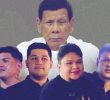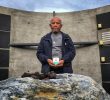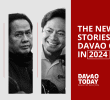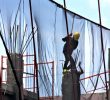Two institutions to watch, if one wants to ensure a clean and honest May 2007 elections, are the Commission on Elections (Comelec) and the Armed Forces of the Philippines (AFP). Ironically, these are the very institutions supposedly tasked with ensuring the conduct of clean and honest elections. But these institutions are again in the thick of controversy — a portent of things to come?
BY BENJIE OLIVEROS
Bulatlat
MANILA — Information plugs by major media networks, even the telecommunications company Globe, call on the Filipino people to guard their votes. It won�t hurt to add another voice to the calls for vigilance. After all, charges of fraud during the May 2004 elections have never been resolved, just swept under the rug of Batasan, courtesy of Pres. Gloria Macapagal-Arroyo�s allies in the Lower House. To add insult to injury, Virgilio Garcillano, the former Commission on Elections (COMELEC) official caught on tape talking with the president in the infamous �Hello Garci� tapes, is even running for representative in Bukidnon.
Two institutions which figured prominently in the �Hello Garci� tapes as allegedly the main operators in committing fraud, the COMELEC and the Armed Forces of the Philippines, are again in the thick of controversy.
For one, the COMELEC has never investigated the �Hello Garci� controversy nor has made any remedial measures to prevent the commission of the same. The COMELEC cannot hide under flimsy excuses that there were no complainants or there were no evidences to prove the allegations. The COMELEC is tasked with ensuring that elections are clean and orderly. And the credibility of the election process is hinged on the unquestionable integrity of the COMELEC and the trust the Filipino people endows on it. The COMELEC cannot be content with the 46 percent trust rating it got from the Social Weather Station survey.
Worse, the anti-fraud group Kontra Daya (Anti-Cheating) revealed that COMELEC officials suspected of being involved in dagdag-bawas (vote padding and shaving) operations in Mindanao in 2004 were even promoted to the level of regional directors and provincial officers.
The COMELEC also seems to be dragging its foot in investigating cases filed by the opposition or exposed by the media such as the disqualification case against Joselito Cayetano, which has been finalized merely three days before the elections, vote buying cases against administration candidates and officials including Justice Sec. Raul Gonzalez, electioneering case against the AFP filed by Bayan Muna (People First) and other Left-leaning party-list groups, among others. And while it made the process of accreditation difficult for some party-lists such as Ladlad, it seemed to have fast-tracked the accreditation of party-list groups being linked to Malacanang. Further fuelling suspicions of complicity, it refused to reveal the nominees of these dubious party-list groups until the Supreme Court ruled on the matter.
The COMELEC will again be tasked with supervising the conduct of elections and canvassing the election returns at the municipal, city, provincial, and national levels. The process of canvassing should be monitored as this is most vulnerable to dagdag-bawas operations.
The participation of the AFP in allegedly rigging the results of the 2004 elections was also exposed in the �Hello Garci� tapes. The subsequent testimony of Brig. Gen. Francisco Gudani, who was mentioned in the �Hello Garci� tapes as an obstacle to the rigging operations for allegedly being close to the opposition, in the Senate hearing investigating allegations of fraud in the 2004 elections added credence to the �Hello Garci� tapes. Gudani�s testimony was widely-believed to have triggered the issuance of Exec. Order 464, which prohibited government officials from testifying without the consent of the president. AFP generals allegedly mentioned in the tapes as part of the dagdag-bawas operations have also been promoted to the highest positions in the military hierarchy.
Already a group of retired AFP officers revealed a supposed operation, dubbed �Oplan Mercury Rising,� to rig the May 2007 elections. During the recent local absentee voting, there were reports that AFP officers had ordered soldiers to vote straight for Team Unity, the administration ticket. Malacanang and AFP denied both allegations.
Bayan Muna, Anakpawis (Toiling Masses), Gabriela Women�s Party, Kabataan, and Suara BangsaMoro, charged the AFP with electioneering for telling the people not to vote for them and to vote for some party-list groups, such as ANAD, Bantay, and VFP, instead. While the AFP vehemently denies this, it never fails to mention these party-list groups as communists and �front organizations� of the Communist Party of the Philippines (CPP) and New People�s Army (NPA) which it identifies as threats to national security. There were also testimonies of organizers of these party-list groups who were harassed. Worse, they have become targets of extra-judicial executions and enforced disappearances by death squads which are widely-believed to be led by or part of the military.
A major media network also aired video clips of testimonies of witnesses revealing that soldiers were seen pasting campaign posters of Dato Arroyo, congressional candidate for the first district of Camarines Sur and son of President Arroyo. In the footage, the reporter was shown pointing to a stack of campaign posters of Dato Arroyo in a room being used by soldiers.
If these are not partisan politics, then what is?
The effect of any action by the AFP for or against any candidate or political party cannot be understated. It is the biggest armed organization in the country. Only those courageous enough will not be somehow affected by the �persuasive� powers of armed soldiers.
The COMELEC can redeem itself from the cloud of doubt hovering over it since the May 2004 elections, if it chooses to do so. The AFP can disengage itself from partisan politics and fulfill its duty to serve the country and the Filipino people, not just the party in power.
In any case, only a vigilant citizenry can prevent the probable commission of fraud and coercion even by powerful institutions such as the COMELEC and the AFP. If widespread fraud and coercion is committed in spite of the vigilance of the citizenry, then it is also up to the people to claim the vote that has been denied them and correct the wrong that has been done to them. Bulatlat
2007 Elections









